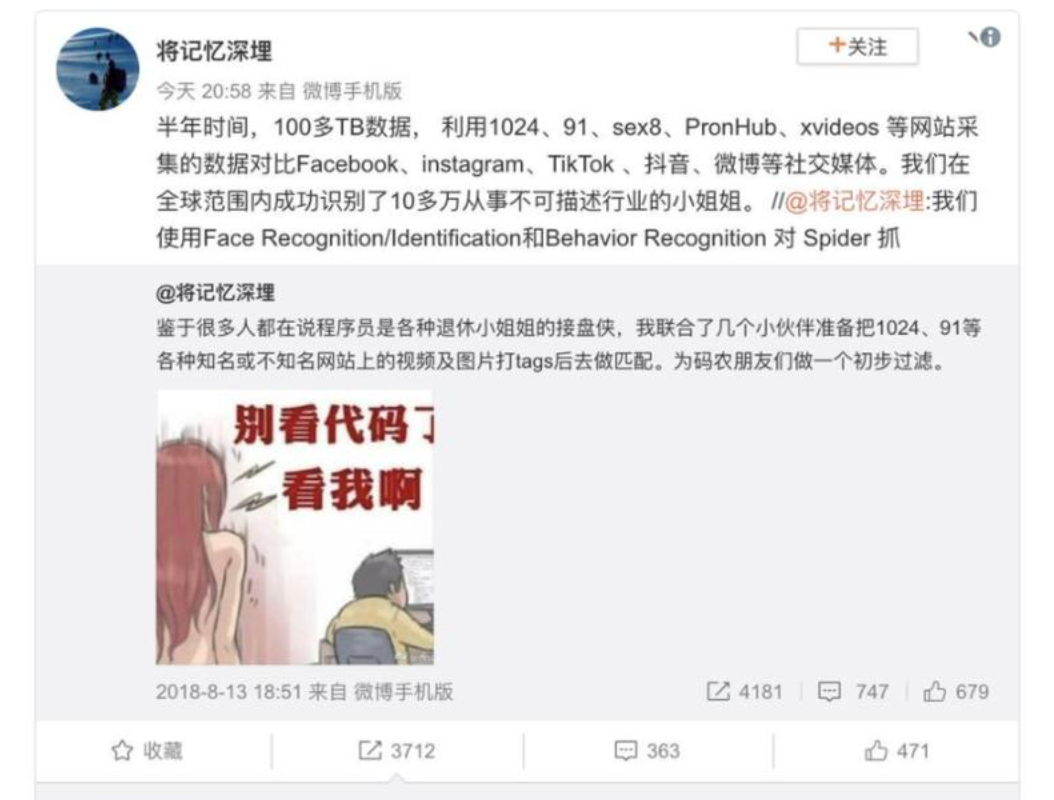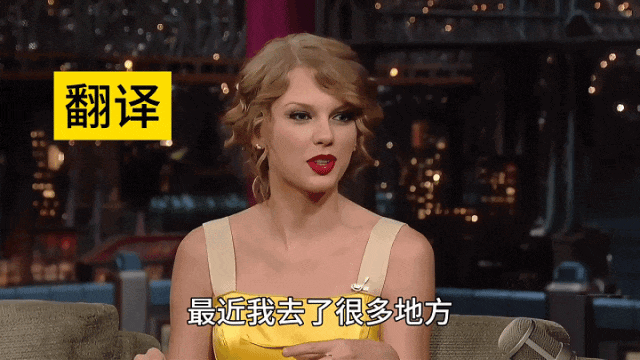Porn, AI, and slut-shaming: A Chinese programmer’s war on ‘promiscuous’ women
Porn, AI, and slut-shaming: A Chinese programmer’s war on ‘promiscuous’ women

On May 27, Weibo user @将记忆深埋, a Germany-based Chinese entrepreneur, announced the completion of an AI-powered algorithm that uses facial recognition technology to identify porn actresses and cross-reference their appearance in adult content with their online presence on social media.
The computer programmer claimed that after working on the project for more than six months with a group of six collaborators across the globe, his product had “successfully identified more than 100,000 young ladies” working in the adult industry. The scope of the project was massive: more than 100 terabytes of data were scraped from a host of major pornography sites, including PornHub and China’s largest adult website, Caoliu, as well as social media platforms including Facebook, TikTok, and Weibo.

When the idea was first made public in August 2018, @将记忆深埋 wrote on Weibo that the program was designed to prevent more computer engineers from becoming “chivalrous men who end up taking care of a mess (jiēpánxiá 接盘侠),” a Chinese term coined to describe sex-deprived men who get married to women who have a high number of lifetime lovers and feel “duped” afterwards. “My goal is to offer an initial filter for my friends in the coding world,” he wrote.
Back then, the post didn’t spark much of a discussion on Chinese social media, except for a few supportive comments from his fellow programmers, who praised the project as a “true blessing” for them. But this time, after the anonymous entrepreneur said that he was poised to roll out the algorithm, the Chinese internet was ablaze with criticism and fury, as many accused the developer of abusing facial recognition technology for unethical purposes, of violating personal privacy, and being a virulent misogynist who believes that women who have had “too much” sex are unworthy of affection and marriage.
In the face of the intense backlash, @将记忆深埋 wrote a series of follow-up posts in which he provided more details regarding the project. According to him, in the middle of development, it suddenly occurred to him that the system would be of better use if it only allows users to search for information about themselves. It’s particularly beneficial for women whose sex tapes are leaked without their permission, he said. In addition, he insisted that the project was born out of pure altruism, as he wanted to help those “in need of help.”
Unsurprisingly, these explanations, some of which obviously contradict the original objectives stated a year ago, did little to stem the outrage. On May 31, @将记忆深埋 cancelled a scheduled live chat where he was supposed to take questions from the public. A day later, he pulled the plug on the project and promised to delete all its data.
But many questions remain unanswered, such as the real identity of the programmer, the origin of his hatred of “promiscuous” women, and whether his story of women empowerment was a last-ditch effort to stave off more criticism.
In an attempt to answer these questions, Midnight Sun Workshop 极昼工作室, a WeChat blog affiliated with Sohu News, published an article today that includes an exclusive interview with @将记忆深埋. While the programmer revealed little about his real identity and his replies were “short and generic,” as the interviewer describes it, the article did offer a glimpse into his mind.
Some highlights (i.e., lowlights):
On “promiscuous” women:
“The initial goal of this project was to find promiscuous women.
“They are females who boast about how many men they’ve slept with and how much they like having group sex. My parents told me to stay away from these ‘messy women.’ There are no promiscuous women around me.”
On why he started the project:
“I have an old friend from college who got hurt by people like this. Last year, he found himself infected with HIV and attempted to borrow money from me to pay for medical care. He seemed desperate and regretful when he talked about this. The disease had a huge impact on him. It turned him from an outgoing person to a quiet person. He’s doing fine right now as he’s receiving treatment.
“I don’t know if the woman who transmitted the virus to my friend is a sex worker, but I’ve found some videos of her having sex with black men on some porn sites. She didn’t know she was HIV positive until my friend found out.”
On the project’s scope:
“Among the 100,000 women we identified on a global scale, less than 1,000 of them have accounts on Weibo and Douyin. The number is kind of surprising, but it makes sense given that we didn’t collect much information on Chinese social media.
“Men are not targeted in this project because we didn’t collect enough social media information from them to train the algorithm. There is a high potential of inaccuracy if we rush to release a male version. I don’t have much energy to do it now since my work is busy.”
On slut-shaming:
“The criticism is entirely invalid. This is typical defamation. When I announced the project in August last year, I had considered privacy issues.
“I totally didn’t anticipate those criticisms. I thought it would only be attacked by the adult industry. I didn’t encounter any similar opposition or attacks when working on the project.
“My fiancé was very supportive. When she learned about the project, she offered to let me spend less time shopping with her so I could finish the project sooner. She knew that the money spent on the equipment was out of my own pocket and she didn’t give me a hard time. Her attitude was like before in the past few days. Nothing has changed.”
On accuracy:
Sohu interviewer: “How do you differentiate women who were filmed having sex without their consent from porn actresses?”
Programmer: “From the angle of the camera.”
“How do you differentiate sex videos filmed by prostitutes and clients from those recorded by couples?”
“There is no way to do that.”
On reflection:
“I deleted all the data because I couldn’t withstand the pressure of public opinion.
“Yes, I did something wrong. I should have made a comprehensive plan before I announced the release. I should have clarified what we wanted to achieve exactly and tried to gain support from relevant departments.
“I feel sorry for the other people involved in the project and those who felt misunderstood.”






